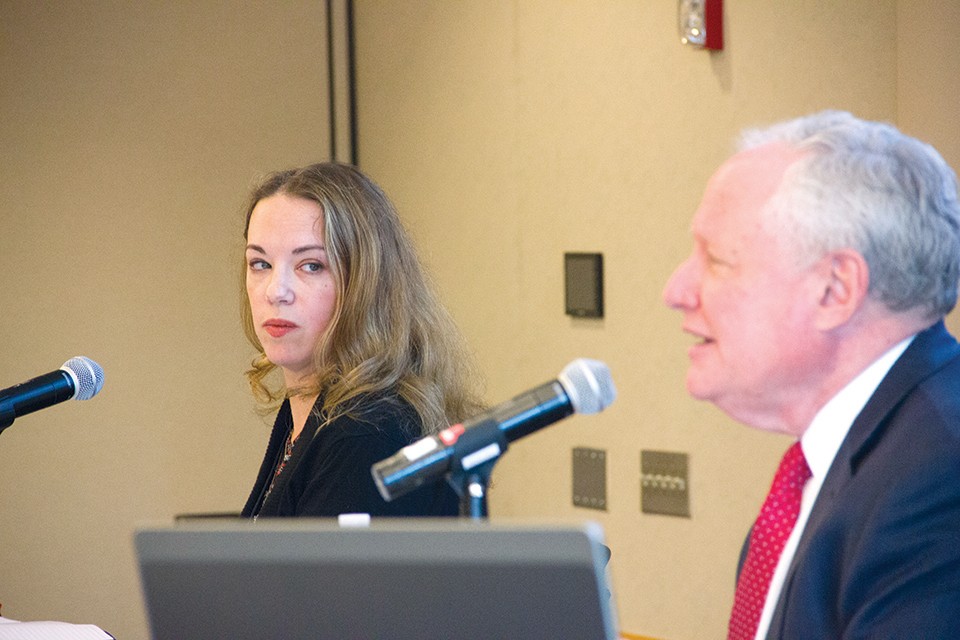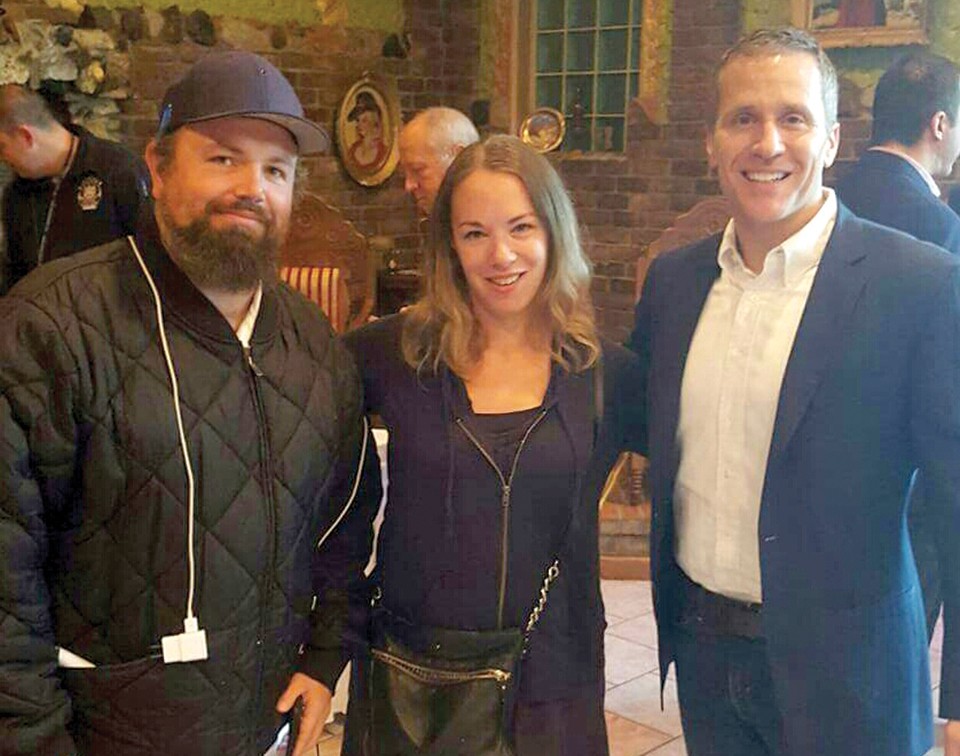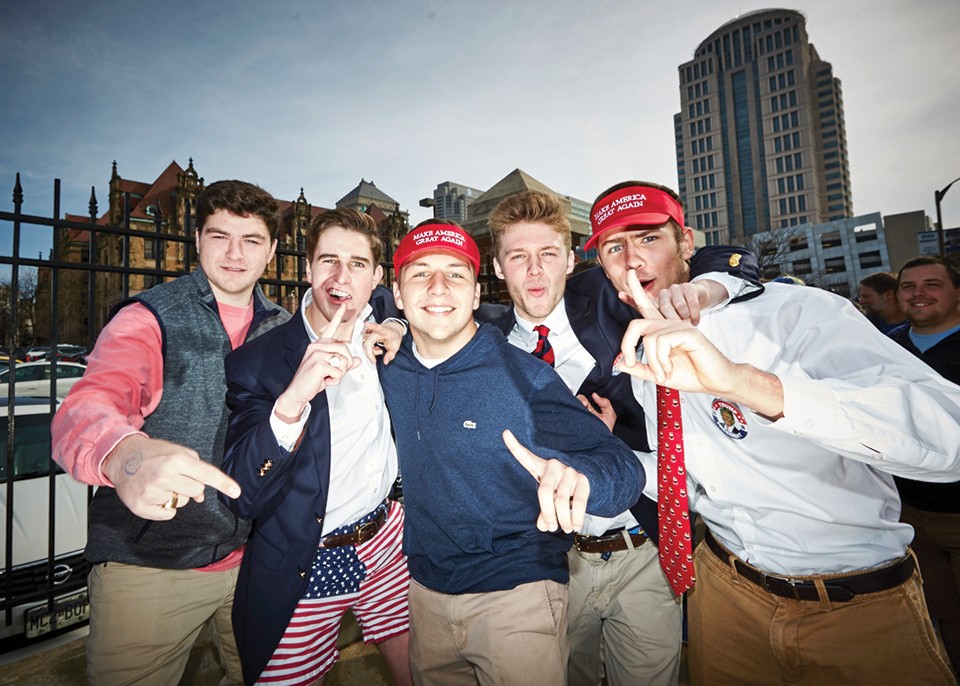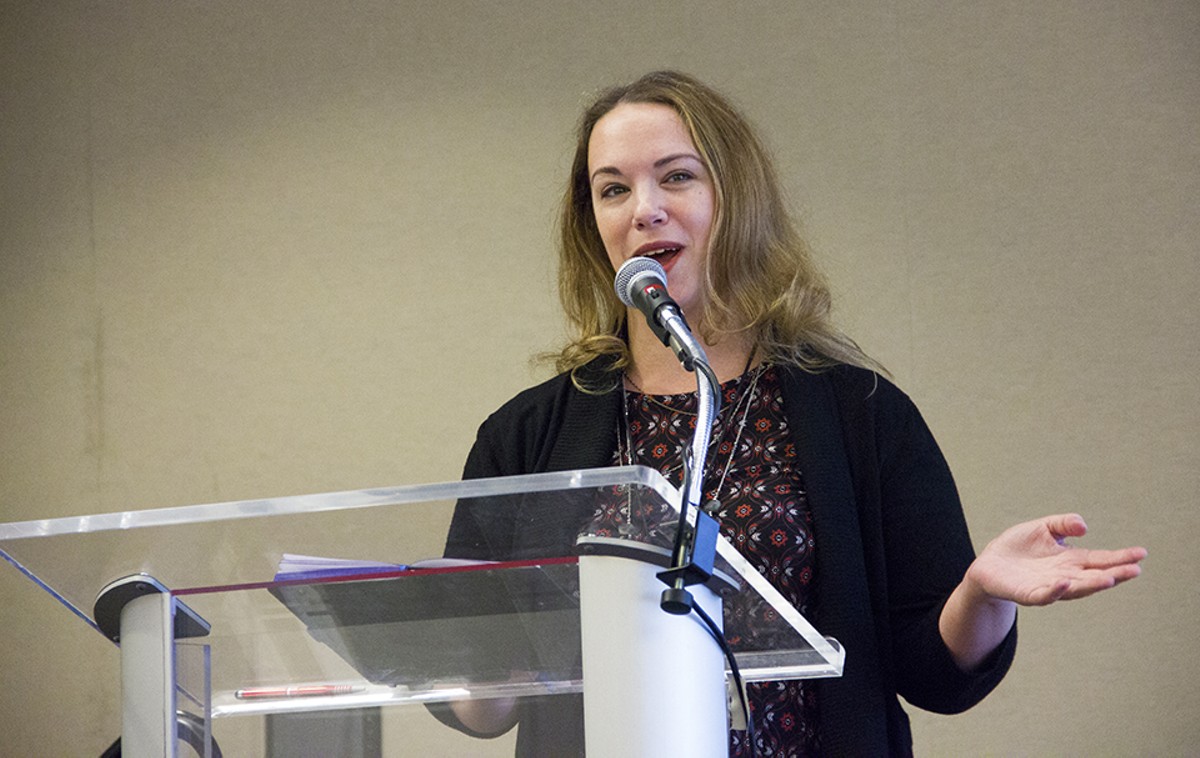Sarah Kendzior is writing. It's March 29, and the St. Louis-based scholar of despots and demagogues is absorbed in her notebook. A tumble of dark blonde hair rests in a pile on her shoulder, stirring with the motion of her pen as she jots down a response to a speech she hasn't heard yet. Around her, the conference room stirs with coffee-powered chatter from the sort of people who attend a 7 a.m. symposium to hear two pundits talk about Donald Trump.
One pundit is Kendzior, and, by now, there are things an audience is virtually guaranteed to hear in a Kendzior speech: that Robert Mueller isn't going to save the country. That democracy is threatened by the "normalization" of propaganda and corruption. That Donald Trump is turning the White House into the headquarters for a "transnational crime syndicate masquerading as a government."
But Kendzior doesn't have top billing at today's Seventh Annual Public Values Symposium, advertised with the tagline "Being a change agent in a divided nation." The keynote speaker at this event, held on the campus of the University of Missouri-St. Louis, is commentator Bill Kristol, who helped shape three decades of Republican politics before he struck out as a leader of the "Never Trumpers," the gang of conservatives who attempted to stop their own party's nominee in 2016. Having failed, Kristol often plays the conservative role on liberal favorite MSNBC. For the most part, when he talks, it's not conservatives who are listening.
Instead, the liberals he's speaking to take their cues from Kendzior. It's not just her nearly 500,000 followers on Twitter. A regular on MSNBC's weekend morning show AM Joy, she is also the author of a best-selling essay collection and co-host of a hit political podcast. Her essays become viral posts, her words transplanted into memes and hashtags.
It wasn't always so; there was a time when Kendzior's apocalyptic warnings about Trump were written off as over-the-top conspiracy mongering. Then Trump won, and his government started locking up kids on the border. No one swooped in to save the day. He wasn't checked or balanced. Kendzior warned that we were halfway to an authoritarian state, and a swath of the country didn't just applaud. They donated money to Kendzior. They bought her book. They invited her to speak at symposia.
In his keynote address, Kristol, who once served as an adviser and chief of staff to Vice President Dan Quayle, is unfailingly reasonable. The nation may be divided, he remarks, but he remains confident in the survival of the system. "One of the big stories of the Trump years, for me, is the strength of American institutions," he says.

For a moment, the remark disengages Kendzior from her notebook. She spares a glance at Kristol as he praises the "massive infrastructure" of American institutions "that check the damage a demagogic president can do."
"We are not Hungary," he continues reassuringly. "We are not Venezuela. We are not a place where, if you get a bad president, he can corrupt half the judiciary, take over half the media, tell the universities what to teach."
It's a perfect example of the sort of patriotic trust that, in Kendzior's view, is hastening America's fall to brutalism and autocracy. When she takes the podium after Kristol, she is biting in her opinion of America's institutions, presented by Kristol as a bulwark in a nation momentarily weakened.
To Kendzior, that perspective is a mirage, and worse. She tells the crowd, "Belief in American exceptionalism is what got us here."
To agree with Kendzior is to accept a very unpatriotic idea: that America's exceptional past stopped offering reassurance the moment Trump took office. It is this American present that Kendzior tried to warn the world about, a place where values are fungible, truth is marketable and despotism is a shadow creeping across the landscape.
It is a shadow Kendzior saw early, not in Washington or in Moscow, but in St. Louis. It was here, in flyover country, that she perceived a new American future — not the dawn of a better era, but a dwindling. The cataclysm was reflected in the economic desperation of a city wracked by inequality and failed promises of recovery.
In St. Louis, everything Kendzior had seen and studied in her life came into focus. It was here that she first wrote the words, "We live in the tunnel at the end of the light."

"I have this horrible feeling," Kendzior says now. "Like I was conjured in a lab to cover Donald Trump."
Born in Meriden, Connecticut, Kendzior got her first byline at ten by winning a writing contest for Consumer Reports. Her first beat wasn't politics, but children's TV shows. Even her early work was unsparing. In her 1989 review of ABC's Free Spirit, the middle schooler chided, "The plot? It's hard to write about something that's not there."
Kendzior didn't get paid for the work. She can't help but note the irony.
"I only got paid in exposure," she says through a smile. She narrows her eyes, adopting an expression of mock seriousness. "So, it really set the scene for the future of the media economy."
Kendzior once seemed destined to thrive in what used to be the thriving journalism business. In 2000, after graduating with a degree in history from Sarah Lawrence, she leaped into a job at the New York Daily News, copyediting and uploading the paper's print editions to its early website.
Getting hired by one of the country's biggest papers right out of college should have kickstarted a long career. Her knowledge of web design and willingness to work long nights seemed like points in her favor.
As she covered the attacks of September 11, 2001, however, she says the constant updates finally convinced her bosses to update the website independently from the print issue. The future of journalism had arrived. Within a few years, the internet had torn the heart out of the print advertising market, and the media bubble burst. Kendzior survived the first wave of layoffs. She didn't wait around for the second.
Kendzior's interest in dictatorships began while fact-checking Daily News stories on American military bases around Afghanistan. She'd realized then that much of the available information was inaccurate or unreported, and the more she learned about the region's repressive, post-Soviet regimes, the more she wanted to know.
"I always had this question about how fascism rises," she says. "I understood fine the perspective of the dictator, but I did not understand, and I guess still don't understand on some level, how people just stand around and let it happen."
In 2003, she made her first career change, leaving the paper and, soon after, marrying a former Daily News colleague. (The two fell for each other during the long hours of the overnight shift.) But even after leaving journalism, her fascination with fascism and central Asia remained. The couple moved to Turkey, where she taught English in Istanbul. She visited Armenia, Georgia and the border regions of Turkey, all still unaffected by ISIS and the later war in Syria. Some of those areas, she notes, are "refugee camps now."
She adds, "It's very sad to look back. It was a very different world. It showed how dramatically things can change."
Kendzior returned to the U.S. in 2004, determined to turn her fascination with central Asia into a new career. In 2006, she graduated from Indiana University with a master's degree in Eurasian studies and was accepted into a PhD program at Washington University in St. Louis.
The couple intended to raise a family in a city vastly more affordable than New York City, and as they established themselves as Midwesterners — her husband landed a job in St. Louis in marketing — she focused her attentions on Uzbekistan, then a country ruled by a single president since declaring independence from the Soviet Union. She wrote her doctoral thesis on the exiled dissidents opposing Uzbekistan's President Islam Karimov, an authoritarian leader who could boast a 90-plus percent voter approval in all but his first election, in 1991.
Studying Uzbekistan, she began to learn what it meant when a government becomes intertwined over decades with the personality of a demagogue. And in talking to Uzbek dissidents, she learned how to resist one.
"Most dictatorships are democracies on paper," she says. "I remember talking to the dissidents about this, and they basically told me, 'You expect the worst, but you act like the laws on paper should be followed.'"

Academia turned out to be another failed industry. Six years after enrolling at Washington University, Kendzior's published papers and PhD in anthropology amount to worthless professional tokens — the jobs in her field vanished in the 2008 financial collapse as schools increasingly relied on cheap adjuncts.
Leaving St. Louis wasn't an option. Her family had grown to include a baby and a toddler, and she couldn't afford to follow the academic path on a salary of $10,000 as an adjunct professor. Even in other cities, there were no tenure-track jobs waiting for recent PhDs, who were seemingly expected to live off poverty wages until things changed.
At one point, she remembers her adviser suggesting she simply ask her parents for money.
"I started laughing," she recalls. "I am a parent! I'm like 30 years old!"
So she turned back to freelance journalism, soon landing a job as a contributing columnist for Al-Jazeera English. She says she loved the job, at least initially, because "they let me write whatever the hell I wanted."
In her first columns, she laments the victims of low wages and failed industries, wielding prose that often follows an almost lyrical, sermon-like structure. Many of the columns are riddled with statistics, but others draw on Kendzior's own angst.
In May 2013, she wrote the essay "The View From Flyover Country" for Al-Jazeera. It is dominated by despair, the pacing punctuated with wordplay and relentless repetition. She writes like a beat poet stalking a stage, a preacher working her way into a righteous sweat. She writes:
"St. Louis is one of those cities that is always ahead of its time. In 1875, it was called the 'Future Great City of the World.' In the 19th century, it lured in traders and explorers and companies that funded the city's public works and continue to do so today. In the 20th century, St. Louis showed the world ice cream and hamburgers and ragtime and blues and racism and sprawl and riots and poverty and sudden, devastating decay. In the 21st century, St. Louis is starting to look more like other American cities, because in the 21st century, America started looking more like St. Louis."
By that point, Kendzior had already lived in St. Louis for seven years. She was raising two young kids, living through the aftermath of the recession in a city already far beyond the point where a post-industry recovery seemed possible.
The essay concluded: "St. Louis is no longer a city where you come to be somebody. But you might leave it a better person."
Slowly, Kendzior says, she began to understand St. Louis, its complexities and contradictions. Part of that understanding came from her friendship with Umar Lee, a writer and cabbie who had made it a personal hobby to take local journalists on tours of the rarely covered areas of St. Louis, the suburbs north of the central corridor.
On a winter day in 2012, Lee picked Kendzior up in his cab and set off, driving through Pine Lawn, Jennings, Ferguson and Kinloch.
"It was a snowstorm," Lee recalls, "but I gave her a several-hour tour of all over St. Louis city and county, like I did for everybody."
Journalists, says Lee, are often trapped in the bubble of their neighborhoods, their view of St. Louis limited to certain bars and restaurants and the city's sports franchises. When he met Kendzior, he remembers being struck not just by her grasp on the government structures of the suburbs they passed by, but her empathy for the people they met along the way. Lee and Kendzior went on to share bylines, including on a lengthy feature for Politico Magazine covering Ferguson and the "decaying black suburbs" north of St. Louis.
Lee grew up around those often forgotten suburbs. Kendzior, he notes, had none of the aloofness that he'd come to expect from New York City reporters.
"She's really good at getting people to open up, being empathetic," he says. "I think she has a natural gift for that. It's not from an academic background."
In 2014, Kendzior quit Al Jazeera, writing in an outraged Twitter thread that the outlet had started pressuring contributors to write more "hot takes" and less thoughtful pieces. It wouldn't be the last outlet Kendzior would blast on the way out the door, but she never failed to find a landing place for her columns.
Her range was impressive; she could just as easily expound on the hyper-local stories of St. Louis as central Asian regimes. In 2015, she interviewed St. Louis Treasurer Tishaura Jones for a story about predatory payday loans for the Guardian. Three days later, her name appeared in the New York Times, as the author of an op-ed analyzing the legacy of a massacre in Uzbekistan.
Later that year, with the presidential election season kicking off, Kendzior's various areas of expertise finally collided in a common subject: a populist celebrity who won flyover country by vowing to "Make America Great Again," a platform that joined the promise of a stronger country with a vow to expel the culprits — Mexicans and Muslims — who were supposedly dragging it down.
Kendzior watched the growing groundswell from a deeply red state with mounting anxiety. In March 2016, she stood alongside giddy Trump supporters at a campaign rally in downtown St. Louis. The line to get in snaked around city blocks.
"I spoke to everyone in line," she recalls. "I listened to them tell me about the hope they had in him, how they really believed he was the guy from The Apprentice, that he was this powerful businessman who was finally looking out for the economic opportunities of regular people."
Kendzior and hundreds of others arrived too late to get a seat inside. With the Peabody Opera House quickly packed to capacity, the overflow became a churning crowd that spilled into the cordoned-off streets. Inside, protesters dropped a banner from a balcony, and minutes later a block of the audience rose in unison, chanting and locking their arms while security guards dragged them out of their seats. Outside, Kendzior watched fistfights erupt, the violence ending with bloodied protesters being led away by police.
She remembers standing outside the opera house, listening to Trump's voice booming through the speakers that had been set up to ensure the candidate's message — and chants of "build that wall" — wouldn't be lost on the throngs who failed to make it inside for the show. The crowd outside, she says, "became a mob."
"Their worst impulses came out," she explains, "things people never thought they could say in public, and permission was granted by Trump saying those things. This is how demagogues form their movements. It's a very frightening thing to witness first-hand."
But it was also frustrating. Some media outlets treated Trump's campaign as a movement destined for the mockery of historians. "At that point," she says, "people still thought it was hilarious that he was running, that this was really funny."
Kendzior had stopped laughing at Trump months prior, seeing his smearing of Mexicans as rapists and murders as a move right out of the authoritarian textbook. The fact that Trump wasn't shy about blatantly scapegoating minorities — or pledging to crack down on Muslim immigration — only strengthened her sense that she was witnessing something familiar and horrible. Openly declaring a national program of persecution "is very typical of dictators" of central Asia, she points out. "They want to flaunt that power."
With Trump ascendant, Kendzior's work was suddenly in high demand. Her coverage of the St. Louis rally was published in the Guardian, and two weeks later, the Diplomat, an international online news magazine, published a Kendzior essay placing Trump within the "spectacle states" she'd studied in central Asian dictatorships. Trump, she wrote, was like an American version of Turkemenistan's Saparmurat Niyazov, the late despot who built a personality cult so deep that he ordered the days of the week renamed to evoke details from his autobiography.
One month after the St. Louis rally, Trump notched his sixteenth Republican primary win. Days later, Kendzior tweeted, "We live in the tunnel at the end of the light."
The line predated Trump. It first appeared in a 2013 Kendzior essay about "surviving the post-employment economy," but it had come to her again, three years later, rising in her imagination alongside the certainty that not only would Trump be the GOP nominee for president, but that he could win.
"When I tweeted that out, it was clear to me that he was going to win the primary," she says now. "I saw this as basically confirmation of everything I'd been warning about for years. That this could happen here. That we weren't safe and that we were heading into something more vicious and awful than what we'd already endured."

More than two years into Trump's first term, Kendzior has turned her uncommon background into an unusual career, albeit one she hopes will be temporary. ("Journalists don't fare well in authoritarian states," she quips.)
While her academic career provided only the opportunity for poverty, freelancing is little better, though it does allow her to work from home. That means she doesn't have to pay for childcare.
On the other hand, Kendzior is not on contract with MSNBC (she says she's not paid for her appearances on cable news) and her actual, income-making "career" is more of a jumble. She's been hired to speak at conferences in North America and Europe, and she currently serves as a freelance American correspondent for the Globe and Mail, a Canadian newspaper.
In 2018, with Kendzior's name on viral tweets and face on cable news, her publisher re-released her 2015 ebook The View From Flyover Country as a physical book — and despite featuring articles written years before the rise of Trump, it became an instant best seller in a country suddenly desperate to understand how things had gotten to this point. No less than Hillary Clinton praised the book in a speech after the election, calling it "especially relevant in the midst of our current health-care debate."
At first, Kendzior wasn't sure what to make of the reaction. Some fans had branded her a Cassandra, a tragic figure who'd tried to warn us of the danger posed by Trump.
"People act like I have magical psychic powers," she says. "Like, no, this is unfortunately what I've studied my whole life."
Kendzior's burgeoning fame, though, has marshaled a vocal and politically aware audience, fans who buy her book and retweet her every word, followers who message her with thanks for preparing them for the latest twists of the Trump saga.
In return, Kendzior projects intellectual clarity in a climate often dominated by ambiguity. She is not CNN or the New York Times, treating Trump's lackeys as reasonable political actors. She sees much of the media as useful idiots, and she refuses to play the fool. Last month, during an appearance on MSNBC, she accused the GOP of seeking a "one-party state." Trump, she said, "wants to be an autocrat with that state behind him." Her fans eat it up.
In a way, Kendzior still hasn't moved on from the 2016 election. Since last summer, she's co-hosted the "Gaslit Nation" podcast, which aims to re-evaluate the election with a perspective drawn from the ocean of subsequent revelations — and indictments — that continue to shape and re-shape what we know about Trump, his campaign and the degree to which Russian influence assisted him in becoming president.
The podcast, an instant hit, now has 40,000 Twitter followers. And now she's not just preaching to the choir; she's funded by it. The podcast's Patreon page counts more than 2,300 monthly contributors, each paying at least $1 to support the production of the show — and some much more than that. (The show's highest contributor level, "Muckraker" requires a $300 monthly commitment. Kendzior declined to provide the show's exact monthly income.)
She has her doubters. On Twitter, Kendzior says she's become a target of left-wing trolls for criticizing Speaker of the House Nancy Pelosi (D-California), who recently argued that impeachment would give Trump exactly the martyrdom that he desires.
Kendzior says that position is absurd. "People keep forgetting that Trump is someone who has manipulated tabloid media and then reality TV," she says. "He has a great understanding of propaganda, and he does not want these kinds of hearings to happen."
Even if the GOP-led Senate would never vote to remove Trump, she says, the process retains more than symbolic value. "Impeaching puts evidence in the public domain," she suggests. "It clarifies what has happened and it forces people to show who they are, under oath, in an environment they can't control."
It's not just impeachment. Her worldview often presents the reality of a conspiracy at work, a kind of corkboard universe crisscrossed in red thread that links Russian agents to American politics. It isn't easily digested. She's been criticized as a one-woman engine of confirmation bias, a Russiagate truther who bends every new development into her theory of America's imminent fall to full-blown authoritarianism under Trump.
In a 2017 essay for the New Republic, Colin Dickey — an academic with a PhD in comparative literature and the author of a book on haunted houses — wrote that Kendzior "relies heavily on comparisons that are technically plausible but far from definitive." Blinded by her bias, Dickey wrote, Kendzior perceives "every action taken by the Trump administration is evidence that we're in the early throes of an authoritarian takeover."
When asked about Dickey and his critique, Kendzior literally rolls her eyes.
"That guy wants to call that confirmation bias," she retorts, "I call that being a woman with a PhD and expertise."

In Trump's America, image is everything. The president can fight subpoenas from Congress and turn around and insist there's no cover up. Up is down, small crowds are big, and no one is less racist or more knowledgeable than a president who embraced birtherism and doesn't like to read.
It is a world ripped from the pages of Kendzior's research, but the voice of flyover country has, as of late, published quite little. Her last published column, from January, was an op-ed about Trump's government shutdown in the Globe and Mail.
Instead, for the last five months, Kendzior has been working on the first draft of Hiding in Plain Sight. It will be her first book — not a collection of essays — and is set to be published by Flatiron Press in April 2020. (Last year, she signed a two-book deal with the publisher.)
The book is intended, she says, to "look back at how we got here."
She says, "One of the problems with why people have trouble understanding this crisis, and I don't blame them, is that this is such an incredible scandal that goes into so many different countries, so many brazen acts of crime and corruption."
Instead, she says people have chosen to tune out the alarms, believing, as much of the media did in covering Trump's election, "it couldn't really be so bad." She calls this perspective "normalcy bias," a delusion that Trump can't permanently damage America. "If it really was so bad," it whispers, "the FBI and intelligence agencies would have done something to stop it."
Mueller may have punted on indictments, but to Kendzior, the ongoing revelation of Russia's meddling in the 2016 election vindicated her arguments dozens of times over. From the indictment of Russian hackers to the trial of Paul Manafort to the confession-cum-testimony of Michael Cohen, Kendzior sees the steadily thickening outline of the treachery that produced Trump's election.
But writing a book that won't be released until months before the 2020 election poses new challenges. She's already planning revisions to a chapter on Missouri to reflect the fact that its Republican governor just signed into law one of the strictest abortion bans in the country — a prelude, perhaps, to an attempt by the Supreme Court to finally allow states to ban abortion.
"This is what I've been trying to tell people, yes, they will take it that far," Kendzior says. "If you refuse to look at it head on, people suffer as a consequence."
To believe Kendzior is to believe that she never wanted this new career, that she derives none of the conspiracist's satisfaction of drawing a new thread across the corkboard. That she is motivated by consequences, by the knowledge of how authoritarian states thrive on a slow churn to nightmare, and that in time, even the heinous can seem normal.
When Kendzior left journalism and traveled to Turkey in 2003, it was a country with a recently elected president, Recep Tayyip Erdoan, who was widely seen as a reformer who could integrate the country with the European Union. Her students in Istanbul were optimistic about their future.
Kendzior kept in touch with some of her students after leaving Turkey, but time has changed that country and its leader, who remains in power more than a decade later. She says she hasn't heard from her former pupils since 2013, when Erdogan's regime cracked down on press freedom and social media.
No one wants to believe they live in an autocracy. To see the dark coming, says Kendzior, requires a "dark imagination." But there is some optimism, even now: In 2020, Kendzior expects Trump to face an American electorate who, despite the bluster and propaganda, "sees through his false promises." This time around, she suggests that his path to victory will require even more blatant "voter suppression and foreign interference."
In a free and fair election, she predicts, "he wouldn't be elected."
But that possibility raises an even darker portent, the final test of all authoritarians. Like Erdoan in Turkey, Niyazov in Turkemenistan and Karimov in Uzbekistan, the measure of a successful demagogue isn't necessarily the number of elections they can win. It's in their power to transcend elections, to remain in power decade after decade.
And so the danger, for Kendzior, isn't that Trump will win. It's that he loses, but it won't matter anymore. "I don't think he will leave," she suggests, "unless he's facing legal consequences, like indictments."
Win or lose, if Trump remains past 2020, the future grows blurrier, darker, harder to predict even for an expert.
"I don't think there are limitations for the worst-case scenario," Kendzior says of Trump and his allies. "Think of the worst thing possible that they could do. They'll try to do it. I tell people, look out for who is the worst off, and fight for them. Let that be your moral compass."






